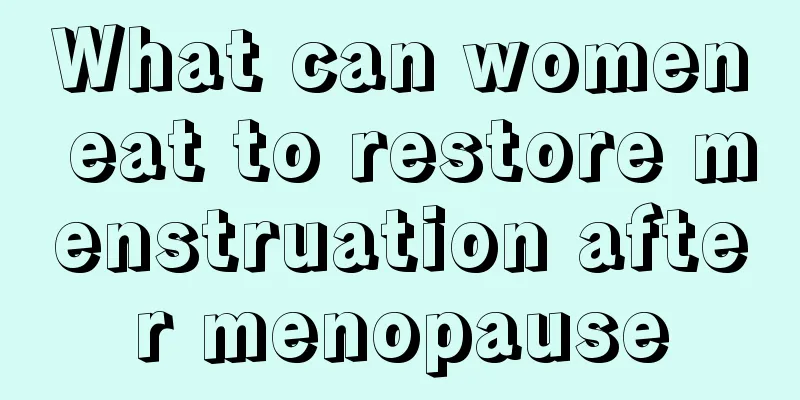Constipation after ovulation

|
For women, various problems can easily occur during the menstrual period. For example, back pain, leg pain, etc. So, if constipation occurs after ovulation, what causes it? In fact, constipation does not have much to do with ovulation period. If there are any related factors, the most closely related ones are daily diet and exercise. After all, lack of dietary fiber is the root cause of constipation. 1. Age-related The prevalence of constipation in the elderly is significantly higher than that in young and middle-aged people. This is mainly because with increasing age, the elderly's food intake and physical activity decrease significantly, the gastrointestinal tract secretes less digestive fluid, the tension and peristalsis of the intestine weaken, the abdominal and pelvic floor muscles become weak, the internal and external anal sphincters weaken, the gastrocolic reflex weakens, and the rectal sensitivity decreases, which causes food to stay in the intestines for too long and excessive water absorption causes constipation. In addition, elderly people often lose their defecation reflex due to senile dementia or depression, causing constipation. 2. Bad living habits (1) Dietary factors: Elderly people who have lost their teeth prefer to eat low-residue, refined foods. Or a small number of patients seek convenience and save time by eating a simple diet that lacks crude fiber, which reduces the volume of their stool, increases its viscosity, slows down its movement in the intestines, and causes excessive water absorption, leading to constipation. In addition, the elderly may also suffer from constipation because they eat less, their food is low in calories, and their gastrointestinal transit time is slowed down. Reports have shown that the gastrocolic reflex is related to the amount of food eaten: a 1000-cal meal can stimulate colonic movement, while a 350-cal meal has no such effect. Fat is the main food that stimulates the reflex, while protein has no such effect. (2) Bowel habits: Some elderly people do not develop the habit of regular bowel movements and often ignore the normal urge to defecate, which results in the suppression of the defecation reflex and causes constipation. (3) Reduced activity. Due to certain diseases and obesity, the elderly have reduced activity, especially those who are bedridden or in a wheelchair. Due to the lack of exercise stimulation to promote the movement of feces, they are often prone to constipation. 3. Psychological factors People with psychological disorders such as depression, anxiety, and obsessive-compulsive disorder are prone to constipation. 4. Intestinal lesions Intestinal lesions include inflammatory bowel disease, tumors, hernia, rectal prolapse, etc. These lesions lead to functional outlet obstruction and cause defecation problems. 5. Systemic lesions Systemic diseases include diabetes, uremia, cerebrovascular accident, Parkinson's disease, etc. 6. Iatrogenicity (abuse of laxatives) Long-term use of laxatives, especially stimulant laxatives, causes damage to the intestinal mucosal nerves, reduces intestinal muscle tension, and leads to severe constipation. In addition, other drugs that cause constipation include opioid analgesics, anticholine drugs, antidepressants, calcium ion blockers, diuretics, etc. |
<<: Can I sleep on my side after the transplant?
>>: Less vaginal discharge after ovulation
Recommend
Will pelvic effusion affect intrauterine pregnancy?
Women's health is receiving more and more att...
What are the symptoms of female urethritis
Women are actually very susceptible to some ureth...
Diseases caused by abnormal hormone secretion
Estrogen is one of the more important hormones in...
Why is pregnancy so tiring?
Generally, women’s immunity will decrease after t...
Those common oral health care "pitfalls" (I)
This is the 4763rd article of Da Yi Xiao Hu As pe...
If pregnant women eat too much, will it have a big impact on the fetus?
There are many expectant mothers who, after becom...
What is the value and significance of reading? The origin of Reading Day
There is something in the world that, as long as ...
How can I cure lower abdominal pain during menstruation?
Many women experience varying degrees of lower ab...
The reason why there is a small pimple next to the vulva
Reproductive health is something that humans tend...
Fructose, friend or foe?
Fructose is one of the main sources of daily &quo...
Heavy metal mercury exceeds the standard by more than 7,000 times! Be careful when using this whitening cream
Want to get whiter quickly within 2 weeks? You kn...
The benefits and effects of moxibustion on the uterus
The uterus is the most important for a woman. Onl...
What does the darkening of the ovulation test paper before menstruation mean?
It is not accurate to say that the darkening of t...
[Medical Q&A] What is the most suitable exercise for preparing for pregnancy?
Planner: Chinese Medical Association Reviewer: Sh...
Does having sex every day affect conception?
After getting married, many women want to get pre...









